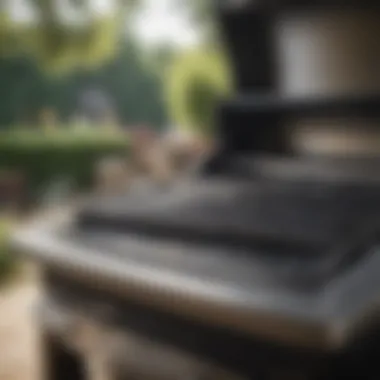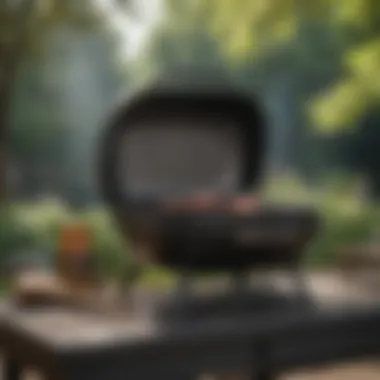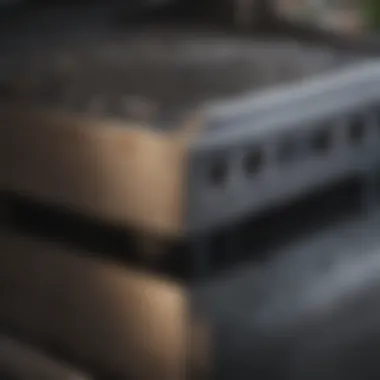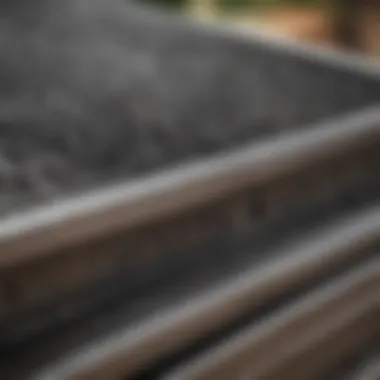The Ultimate Guide to Grill Top Cleaning Techniques


Intro
Cleaning your grill top is not merely an act of sanitation but a crucial step in ensuring the quality of your grilling experience. A clean grill enhances the taste of the food cooked on it, while also promoting health and safety during outdoor cooking. By focusing on effective cleaning techniques and materials, this guide aims to not only prolong the life of your grill but also improve the results of every meal prepared on it.
With a clear understanding of the importance of grill maintenance, we can explore various methods that cater to different needs and preferences. From the basic cleaning procedures to advanced techniques, this guide provides insightful information that can appeal to both novice grillers and seasoned chefs.
Key Insights and Trends
Current Trends in Grill Maintenance
Recent years have shown an increasing trend toward sustainability and eco-friendliness in grill maintenance products. Homeowners are gravitating towards natural cleaners as opposed to harsh chemicals. Vinegar and baking soda are gaining popularity as effective, non-toxic options. Using these materials not only reduces chemical exposure but also aligns with environmentally conscious values.
Techniques that Stand Out
Another notable trend is the use of specialized tools for grill cleaning. Wire brushes have been traditionally favored, but many grill enthusiasts are now exploring alternatives that reduce the risk of bristle contamination and damage to the grill grates. Utilizing silicone scrubbers and grill stones is growing among users who prioritize safety and functionality.
Practical Tips and How-To Guides
Step-by-Step Guide to Cleaning Your Grill Top
- Gather Your Materials: Before starting, make sure you have the right tools. Essential materials include:
- Cool Down: Allow your grill to cool down completely before beginning the cleaning process. Cleaning while hot can lead to burns and ineffective cleaning.
- Remove Grates: Detach the grill grates. This allows for comprehensive cleaning and access to all surfaces.
- Soak Grates: Soak the grates in a mixture of hot soapy water or vinegar. Leave them in for 10-15 minutes, then scrub with a brush to remove any residue.
- Clean the Grill Surface: Spray the grill surface with your chosen cleaner and wipe with a cloth or paper towels. Ensure you remove all grease and ash build-up.
- Rinse and Dry: Rinse the grates thoroughly with water, then dry them completely to prevent rust.
- Reassemble: Once everything is dry, put the grates back in place and your grill is clean and ready for the next use.
- A soft brush or cloth
- Paper towels
- Vinegar or a commercial grill cleaner
- Baking soda (optional)
- A spray bottle
"Regular maintenance is not just about hygiene, but also significantly enhances grilling performance and food safety."
Tips for Continued Maintenance
- Regular Cleaning: Aim to clean your grill after every use to prevent build-up.
- Immediate Attention: Address spills and residue immediately to prevent them from hardening.
- Seasoning Grates: Consider oiling your grill grates before cooking to prevent sticking and aid in easier post-cooking cleaning.
Understanding the Importance of Grill Maintenance
Maintaining your grill is an often overlooked aspect of outdoor cooking. However, it plays a vital role in both the safety and quality of the meals you prepare. Regular cleaning and proper maintenance prevent health risks that may arise from supported bacteria or leftover food particles. Furthermore, a well-kept grill enhances the quality of the food cooked on it. Understanding these points can help homeowners appreciate the significance of diligent grill maintenance.
Health Hazards of a Dirty Grill
A dirty grill can become a breeding ground for harmful pathogens. When grease and food residue accumulate, they can attract insects and rodents, posing a significant health risk. Beyond that, grilling non-cleaned surfaces could result in contaminants transferring to your food. Research shows that grilling over a dirty surface can lead to foodborne illnesses, which might not only ruin your meal but also pose serious health risks. Regular cleaning can greatly mitigate these threats, ensuring that your grilling experience remains pleasant and safe.
Impact on Food Quality
Food quality directly correlates with grilling surfaces. A dirty grill can impart unwanted flavors to your food, especially if there are remnants of previous meals. Oil and carbon buildup can create a smoky taste, overwhelming the true flavors of the ingredients. Additionally, uneven heating due to residue obstructing flames can result in uneven cooking. A clean grill will, therefore, contribute to a more enjoyable and authentic culinary experience. By taking care of your grill, you're also taking care of your meals.
Extending the Life of Your Grill
Investing time in grill maintenance pays off in longevity. Rust and corrosion can occur when debris is left on the grill, leading to damage over time. Keeping your grill clean allows it to function optimally, reducing wear and tear. This will ultimately save you from costly repairs or replacements in the long run. Like any tool, a grill requires care to perform well. A consistent upkeep schedule will not only enhance your grilling experience but also maximize the life of your appliance.
"Regular maintenance not only ensures safety but also enhances the quality of food and prolongs the equipment's life."
In summary, understanding the importance of grill maintenance covers various elements, from health hazards to food quality and extending your grill’s lifespan. These factors underscore the crucial role of routine cleaning and maintenance.
Essential Tools for Cleaning a Grill Top
Cleaning a grill top effectively requires the right tools. Using appropriate tools not only improves the efficiency of the cleaning process but also helps in maintaining the integrity of the grill itself. Each tool serves a specific purpose, making it crucial to have a comprehensive understanding of their functions and benefits.


Scrapers and Brushes
Scrapers and brushes are fundamental tools for cleaning a grill top. They help remove burnt food particles and grease that accumulate over time. A high-quality grill brush, with durable bristles, is essential for heavy scrubbing. Consider using a brush made of stainless steel for optimal performance, as it can withstand high temperatures without losing effectiveness.
Furthermore, scrapers come in handy for tackling stubborn residues. A metal scraper is often effective for ceramic or cast iron grills. It's also important to choose the right size of brush or scraper according to the dimensions of the grill grates. Investing in different sizes can be useful to reach tight corners and crevices that are harder to clean.
Cleaning Solutions
Using suitable cleaning solutions can enhance the cleaning process. Commercial grill cleaners are available and are formulated to cut through grease and grime effectively. However, it is vital to check if these products are safe for the type of grill you own. Natural cleaning solutions, like vinegar and baking soda, are also effective alternatives that minimize exposure to harsh chemicals.
When selecting cleaning solutions, consider those that are non-toxic and safe for food contact surfaces. Applying the right amount and allowing the solution to penetrate for some time will yield better results. Refrain from excessive use of liquids, as it can lead to pooling, affecting the grill's components.
Protective Gear
Finally, protective gear plays a crucial role while cleaning a grill top. Gloves specifically designed for cleaning tasks can protect your hands from grease and chemicals. Additionally, wearing an apron can protect your clothing from splashes and spills that may occur during the cleaning process.
Avoid wearing loose clothing, as it can accidentally get caught in the grill while cleaning. Eye protection is also advisable, particularly when using scrapers or strong cleaning solutions that could splash.
In summary, having a well-rounded toolkit for cleaning your grill top elevates not just the cleansing experience, but also contributes to maintaining the performance and longevity of the grill. Understanding the purpose of each tool ensures a more effective cleaning routine, cultivating a cleaner and safer cooking environment.
Preparing for the Cleaning Process
Cleaning a grill top can seem daunting. However, preparation is vital for achieving effective results. Properly preparing ensures that the process is efficient and safe, leading to a clean grill that enhances your cooking experience. Understanding what needs to be done before getting started will save time and prevent frustration.
Safety Precautions
Ensuring safety while cleaning a grill is non-negotiable. Before beginning the cleaning process, it is essential to wear gloves to protect your hands from debris and harsh chemicals. Eye protection can also be useful, especially if using scrapers or brushes. Additionally, it's wise to work in a well-ventilated area. Many cleaning solutions can emit strong fumes, and proper airflow minimizes risks. Lastly, always disconnect the grill from its gas supply or remove charcoal if applicable. This simple step can prevent accidents and ensure that nothing ignites unexpectedly.
Timing Your Cleaning
Timing is a critical aspect of the cleaning process. Generally, it is preferred to clean the grill shortly after use while it is still warm. This allows for easier removal of grease and food residue. However, caution must be used, as a hot grill can lead to burns or discomfort. If the grill has cooled down, waiting can keep stubborn stains from hardening. Schedule cleaning at least once a month, more frequently if in heavy use. This routine maintains grill performance and prolongs its life.
Selecting the Right Environment
The environment can impact the overall cleaning process significantly. Choosing the right location for cleaning a grill is paramount. Ideally, it should be done outside, away from indoor spaces, due to the potential mess and fumes. A flat surface, such as a patio or driveway, allows for easy movement and access to tools. Also, consider weather conditions. Rain or excessive wind can pose challenges. A dry, calm day will help in maintaining focus and efficiency as you clean, ensuring a smooth process with minimal distractions.
Step-by-Step Guide to Cleaning a Grill Top
Cleaning a grill top is a task that requires attention to detail and an organized approach. The benefits of following a systematic method cannot be overstated. By adhering to a step-by-step guide, you ensure every part of your grill receives due care. This guides not only results in a clean grill but also contributes to a better cooking experience. Moreover, a methodical approach helps avoid damaging the grill and maintains its longevity.
Initial Inspection
Before beginning the cleaning process, an initial inspection of the grill top is crucial. Look for signs of grease buildup, stains, or burnt residues. Pay close attention to any areas that may need more intensive cleaning. Identifying these issues lets you prepare effectively and choose the right tools. This simple step saves time in the long run. Additionally, make sure the grill is completely cool to avoid accidents. Understanding the condition of your grill top informs decisions about which cleaning product and technique to use.
Removing Residue
The next step is removing residue. Start by scrapping off large chunks of food or burnt material. A putty knife or a stainless-steel scraper works well for this task. Make sure to work carefully to avoid scratching the grill surface. You can also use a grill brush, ensuring it is compatible with the grill's material. For stubborn residue, applying a bit of heat can help loosen debris. This step is vital as residue can harbor bacteria and impact the flavor of your food. Cleaning it away prepares the surface for the subsequent washing process.
Applying Cleaning Solutions
Once the heavy residue is removed, it's time to focus on applying cleaning solutions. A suitable cleaning agent will ensure your grill top regains its shine. You may choose a commercial cleaner designed for grill tops or opt for a mixture of vinegar and water. Always follow the manufacturer’s instructions for the cleaning product you choose. Spray the solution evenly across the surface and let it sit for a few minutes. This dwell time allows the cleaner to break down remaining grease and grime. Remember to avoid using abrasive solutions that can damage the surface coating of your grill.
Scrubbing Techniques
With the cleaning solution applied, the next phase is to utilize effective scrubbing techniques. Use a grill brush or a non-abrasive sponge to scrub the top. Make sure to keep the brush at an angle to reach into grooves or crevices. Working in small sections is often more effective than scrubbing the entire surface at once. Regularly rinse the brush in clean water to avoid spreading dirt. This step is crucial for achieving a thorough clean. It also enhances the grill's performance and helps in maintaining food quality.


Final Rinse and Drying
After scrubbing, a final rinse and drying is necessary. Use clean water to rinse off any residual cleaning solution and dirt. A damp cloth or sponge can also assist in this process, ensuring all cleaner is removed. After rinsing, dry the grill top thoroughly. Leaving moisture can lead to rust or corrosion, negating your cleaning efforts. A well-dried grill top not only looks appealing but also ensures it remains in good working order. This final touch solidifies the cleaning process and prepares your grill for the next use.
Alternative Cleaning Methods
Cleaning a grill top can often seem like a straightforward task, but the methods used can greatly impact the effectiveness of the cleaning process. Traditional methods may not always be suitable for every type of grill or every situation. This is where alternative cleaning methods come into play. They can offer flexibility and efficiency, allowing homeowners to choose techniques that best fit their specific needs. Alternative methods can also provide benefits such as eco-friendliness, safety, and enhanced cleaning performance. By understanding these alternatives, one can optimize the cleaning process and ensure the grill's longevity and food safety.
Steam Cleaning
Steam cleaning is a powerful method for deep cleaning a grill top. Utilizing high-temperature steam not only loosens stubborn grease and grime but also sanitizes surfaces effectively. The steam penetrates hard-to-reach areas, ensuring that no residue is left behind. This method is particularly beneficial for stainless steel grills, as it avoids the use of harsh chemicals that may cause corrosion.
Benefits of steam cleaning include:
- Non-toxic: This method does not require any chemicals, making it safer for both the user and the environment.
- In-depth cleaning: The steam can reach areas that brushes may miss, providing a more thorough cleaning.
- Less physical effort: The steam loosens dirt, making removal easier with minimal scrubbing.
When using a steam cleaner, it is important to follow the manufacturer's guidelines to avoid damage. Additionally, ensuring the grill is turned off and has cooled down before starting the steam cleaning process is crucial for safety.
Natural Cleaners
Natural cleaners have gained popularity in recent years, especially among those looking for eco-friendly cleaning solutions. Many common household items can effectively clean a grill top without introducing harmful chemicals into the environment. Ingredients like lemon juice, baking soda, and olive oil can serve as effective cleaners.
The advantages of using natural cleaners are:
- Safety: Natural ingredients pose less risk to health and the environment compared to commercial cleaners.
- Cost-effective: Many natural cleaning agents can be found in the kitchen, reducing the need for special purchases.
- Simplicity: Mixing solutions from simple ingredients can be easy for anyone to do.
A mixture of baking soda and water can create a paste that adheres to greasy spots, making it easier to scrub away residue. While this method is less aggressive than chemical cleaners, it might require more time for the paste to work effectively.
Vinegar and Baking Soda Method
The combination of vinegar and baking soda is a classic cleaning method that has stood the test of time. When combined, these two substances create a chemical reaction that produces carbon dioxide, resulting in fizzy action that helps break down grease and grime.
To use this method effectively:
- Sprinkle baking soda evenly across the grill top.
- Spray white vinegar over the baking soda. You will notice fizzing as the two ingredients react.
- Allow the mixture to sit for about 10-15 minutes. This lets the cleaning action occur.
- After the time has passed, scrub the surface with a grill brush to lift the residue.
- Rinse thoroughly with warm water to remove any leftover baking soda and vinegar.
This method is favored for its effectiveness and affordability. However, like with any method, ensure proper rinsing to prevent any residue from being left behind, which might alter the flavor of food cooked later.
Alternative cleaning methods offer innovative solutions for maintaining the cleanliness and safety of your grill. Understanding these options can ensure a more enjoyable grilling experience.
Post-Cleaning Maintenance
After cleaning your grill top, it is essential to implement post-cleaning maintenance strategies to maximize its longevity and maintain optimal functionality. Regular maintenance not only enhances the cooking experience but also reinforces the importance of hygiene and safety while cooking outdoors.
Seasoning a Grill
Once you have thoroughly cleaned your grill, the next step is to season it. This process involves applying a thin layer of oil to the grill surface, which helps create a non-stick layer. Seasoning can also protect the cooking surface from rust and corrosion. The ideal oils for this task include vegetable oil, canola oil, or flaxseed oil due to their high smoke points.
To season your grill:
- Preheat the grill to a medium temperature.
- Apply a small amount of oil onto a clean cloth or paper towel.
- Wipe the oil evenly across the surface of the grill.
- Close the lid and allow it to heat for approximately 15 minutes.
- Turn off the grill, and let it cool down.
This practice not only preserves the quality of the grill but also enhances the aroma and flavor of the food.


Covering the Grill
Another vital aspect of post-cleaning maintenance is appropriately covering the grill. When the grill is not in use, a well-fitted cover provides protection from environmental elements such as rain, snow, and debris. Using a grill cover reduces the risk of rusting and keeps the grill in good condition for longer. It is crucial to select a cover that matches the grill's size and shape. Covers made of breathable materials are preferable as they prevent moisture buildup that could lead to mold or mildew.
"Investing in a good quality grill cover is a small step that can yield significant results in the longevity of your grill."
Regular Cleaning Schedule
Establishing a regular cleaning schedule is paramount for maintaining your grill's performance. Regular cleanings can help to prevent grease buildup and reduce the risk of flare-ups, leading to a safer cooking experience.
Consider the following tips for an effective cleaning schedule:
- Weekly Cleaning: After heavy use, a quick clean of the grill grates and ashes can be done with a grill brush. This helps maintain cleanliness and prevents food residues from sticking.
- Monthly Deep Cleaning: Conduct a more thorough cleaning of the grill. This should include scrubbing the grates, cleaning the burners, and emptying the grease tray.
- End of Season Cleaning: Before winter storage, perform a deep clean, ensure the grill is completely dry, and season it.
By observing these guidelines, you can ensure that your grill is kept in excellent working condition, allowing you to enjoy outdoor cooking safely and efficiently.
Common Mistakes to Avoid
In the pursuit of maintaining a clean and functional grill top, making avoidable mistakes can severely impact your efforts. Understanding these common errors is essential for any grill owner looking to preserve their investment and ensure food cooked is of the highest quality. This section explores three major mistakes that can compromise both the cleaning process and the health of your grill.
Using Harsh Chemicals
Many grill owners mistakenly reach for aggressive cleaning agents in hopes of achieving a spotless grill. These harsh chemicals may effectively remove grime, but they can also leave behind toxic residues. When cooking, these residues could transfer to food, posing serious health risks. Furthermore, prolonged use of such chemicals can damage the grill's surface, leading to corrosion or other unwanted reactions.
To avoid this, opt for milder, food-safe cleaning solutions. Natural products like vinegar or baking soda can be just as effective without the harmful effects. Occasionally, a gentle soap may serve the same purpose, so always check the ingredients before applying anything to your grill top.
Neglecting Safety Gear
Safety should always be a priority during the cleaning process. Many people overlook the importance of protective gear like gloves and goggles, assuming a simple cleaning task poses little risk. However, improper handling of scrapers, brushes, and cleaning solutions can lead to cuts or chemical burns.
By wearing gloves, you protect your skin from both sharp tools and any harmful ingredients in cleaning products. Goggles help shield your eyes from splashes and debris. Investing in these small precautions not only safeguards yourself but also enhances your overall cleaning experience.
Inconsistent Cleaning Habits
Another frequent mistake is failing to establish a regular cleaning schedule. Many grill owners clean their grill top only when it appears particularly dirty. This inconsistency can lead to the buildup of grease and food particles, making future cleaning efforts more arduous.
Instead, set a regular cleaning habit, whether weekly or bi-weekly. This routine helps prevent heavy buildup, making the cleaning task quicker and easier. Additionally, an organized approach reduces health risks associated with bacteria growth. Simple consistency can transform your outdoor cooking experience from frustrating to enjoyable.
"A clean grill is a happy grill. Establishing good habits leads to better food and a longer grill life."
In summary, avoiding these mistakes enhances not only the functionality of your grill but also the quality of the food prepared. Invest in safer methods, prioritize your personal safety, and establish a consistent cleaning routine. These steps collectively help to maintain your grill effectively and sustainably.
Closure
In this article, the conclusion serves as a critical component in encapsulating the essence of grill maintenance. It emphasizes the importance of consistency in cleaning practices and the long-term benefits derived from maintaining a grill. By summarizing the key insights, it reinforces the notion that proper upkeep prevents health hazards and improves food quality.
Recap of Key Cleaning Practices
To keep your grill in prime condition, several key practices should be routinely followed:
- Regular Inspection: Periodically examine your grill for buildup of grease and food particles. This can prevent more serious cleaning issues later.
- Immediate Cleaning: After grilling, clean your grill while it is still warm. This makes removing residue easier.
- Use Appropriate Tools: Invest in high-quality scrapers and brushes to effectively remove stuck-on food and grime.
- Natural Cleaning Solutions: Consider alternative cleaning solutions like vinegar and baking soda. They are effective and eco-friendly.
Incorporating these practices into your routine can significantly enhance the performance and hygiene of your grill.
Encouraging Routine Maintenance
Routine maintenance is vital for extending the life of your grill and ensuring it operates efficiently. Here are some considerations to promote consistent upkeep:
- Set a Cleaning Schedule: Choose regular intervals for deep cleaning, perhaps after every few uses or seasonally.
- Document Your Cleanings: Keeping a log can help you remember when the grill was last cleaned and what methods were employed.
- Involve Others: If you host gatherings, share the responsibility of grill maintenance with friends or family. This creates a culture of cleanliness.
The health, safety, and enjoyment that a well-maintained grill brings should never be underestimated. By practicing these habits, you will ensure your grill continues to serve you well for many seasons of outdoor cooking.



